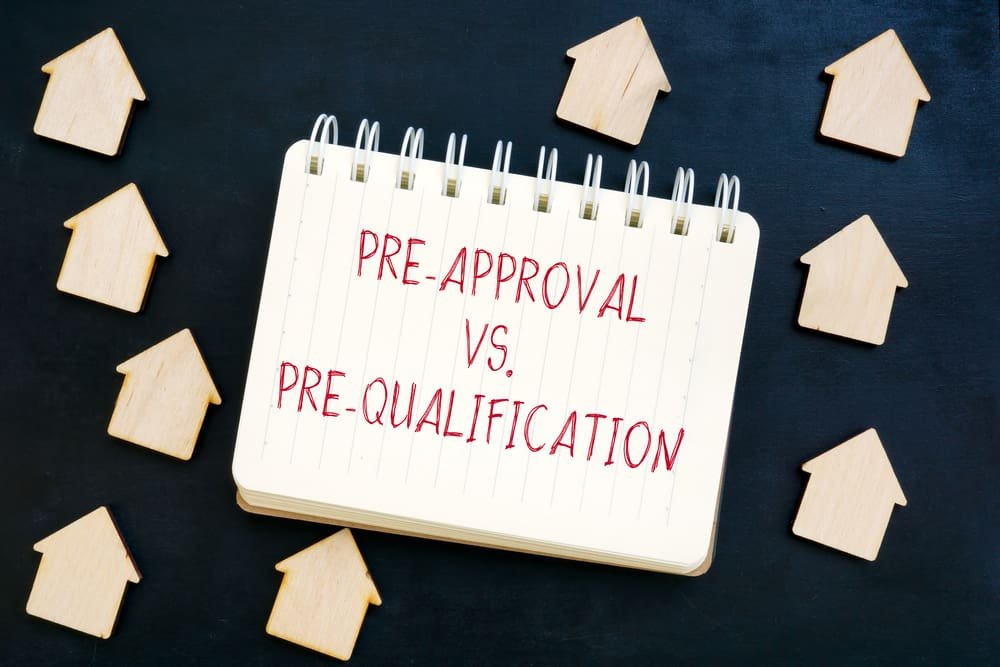The home buying process can be an exciting and challenging journey, and understanding the key terms and steps involved is essential for a smooth and successful outcome. Two important terms that come up in the mortgage process are pre-qualification and pre-approval. While these terms may seem similar, they are not the same and it is important to understand the differences and the impact they have on your home buying process.
In this article, we will explore the differences between pre-qualification and pre-approval, the benefits of obtaining pre-approval, and the impact pre-approval has on your loan. We will also provide guidance on choosing between pre-qualification and pre-approval, to help you make an informed decision in your home buying process.
What Is Pre-Qualification?
Pre-qualification is a step in the mortgage application process where a lender assesses a potential borrower’s ability to repay a loan. The lender will gather information about the borrower’s income, debts, and assets, and based on that information, will provide an estimate of the loan amount that the borrower may be eligible for. The pre-qualification process is typically informal, with the lender relying on the borrower’s self-reported information.
The pre-qualification process is not a guarantee of loan approval and should not be mistaken as such. It is an early step in the mortgage process and is used to help borrowers get a general idea of their buying power and understand what they can afford when shopping for a home. The lender will not verify the information provided by the borrower during pre-qualification, so it may not be entirely accurate.
It is important to note that pre-qualification does not involve a credit check and does not bind the lender to provide the loan. The pre-qualification process is designed to be a quick and easy way for borrowers to get a rough estimate of their loan eligibility, but it is not a guarantee of loan approval or an assurance that the lender will provide the loan. Borrowers should use pre-qualification as a starting point and proceed to the next step of the mortgage process, pre-approval, to get a more accurate and formal assessment of their loan eligibility.
What Is Pre-Approval?
Pre-approval is a more formal and in-depth process compared to pre-qualification. In pre-approval, a lender will thoroughly review a potential borrower’s financial information, including credit score, income, debts, and assets, to determine the loan amount that they may be eligible for. This process usually involves a credit check and the lender will verify the information provided by the borrower.

Pre-approval provides a more accurate estimate of a borrower’s loan eligibility compared to pre-qualification and carries more weight in the mortgage process. Obtaining pre-approval indicates to real estate agents, sellers, and other parties involved in the home buying process that the borrower is a serious and qualified buyer. It also gives the borrower a better understanding of their buying power and the loan amount they can afford.
In summary, pre-approval is a more formal and thorough evaluation of a potential borrower’s financial information and creditworthiness. It provides a more accurate estimate of the loan amount that the borrower may be eligible for and shows that the borrower is a serious and qualified buyer. Obtaining pre-approval can also make the home buying process smoother and more efficient for the borrower.
Key Differences Between Pre-Qualification And Pre-Approval
Here are some key differences between pre-qualification and pre-approval:
- Formality: Pre-qualification is an informal process, while pre-approval is more formal and in-depth.
- Information Gathering: In pre-qualification, the lender relies on the borrower’s self-reported information, while in pre-approval, the lender will verify the information provided by the borrower.
- Credit Check: Pre-qualification does not involve a credit check, while pre-approval typically involves a credit check.
- Loan Amount Estimate: Pre-qualification provides a rough estimate of the loan amount that the borrower may be eligible for, while pre-approval provides a more accurate estimate based on a thorough review of the borrower’s financial information.
- Weight in Mortgage Process: Pre-qualification is not a guarantee of loan approval and carries less weight in the mortgage process, while pre-approval carries more weight as it shows that the borrower is a serious and qualified buyer.
- Commitment: Pre-qualification does not bind the lender to provide the loan, while pre-approval is a conditional commitment from the lender to provide the loan, subject to specific conditions being met.
In conclusion, pre-qualification is a quick and easy way for borrowers to get a rough estimate of their loan eligibility, while pre-approval is a more formal and in-depth process that provides a more accurate estimate of the loan amount the borrower may be eligible for. Obtaining pre-approval can help make the home buying process smoother and more efficient for the borrower.
How Pre-Qualification Impacts Your Home Buying Process
Pre-qualification can impact the home buying process in several ways including:
- Establishing Budget: Pre-qualification provides a rough estimate of the loan amount that the borrower may be eligible for, which can help the borrower establish a budget for their home purchase.
- Improved Negotiating Power: Pre-qualification can demonstrate to real estate agents and sellers that the borrower is a serious and qualified buyer, giving the borrower improved negotiating power during the home buying process.
- Streamlined Process: Having pre-qualification can make the home buying process smoother and more efficient, as the borrower will have a better understanding of their buying power and the loan amount they can afford.
- Confidence in Home Search: Pre-qualification can give the borrower confidence in their home search, as they will have a general idea of the loan amount they may be eligible for and what they can afford.
It is important to note that pre-qualification is not a guarantee of loan approval and does not bind the lender to provide the loan. Borrowers should proceed to the next step of the mortgage process, pre-approval, to get a more accurate and formal assessment of their loan eligibility.
In conclusion, pre-qualification can have a positive impact on the home buying process by helping the borrower establish a budget, improve negotiating power, streamline the process, and increase confidence in their home search. However, it should not be mistaken as a guarantee of loan approval and should be followed by the more thorough and accurate pre-approval process.
The Benefits Of Obtaining Pre-Approval
Obtaining pre-approval offers several benefits to potential home buyers in the mortgage process. It provides a more accurate estimate of the loan amount that the borrower may be eligible for, based on a thorough review of their financial information, including credit score, income, debts, and assets. This can give the borrower a better understanding of their buying power and the loan amount they can afford.
Pre-approval also demonstrates to real estate agents, sellers, and other parties involved in the home buying process that the borrower is a serious and qualified buyer. This can give the borrower improved negotiating power and make the home buying process smoother and more efficient.
In addition, pre-approval provides a conditional commitment from the lender to provide the loan, subject to specific conditions being met. This can give the borrower a sense of security and peace of mind as they proceed with their home search.
Overall, obtaining pre-approval is a crucial step in the mortgage process that can provide potential home buyers with a more accurate estimate of their loan eligibility, improved negotiating power, and a sense of security as they proceed with their home search.
Understanding The Impact Of Pre-Approval On Your Loan
Pre-approval has a significant impact on the loan process as it provides a more accurate and formal assessment of the borrower’s loan eligibility. It gives the lender a thorough review of the borrower’s financial information, including their credit score, income, debts, and assets. This information is used to determine the loan amount that the borrower may be eligible for, which can help the borrower establish a budget for their home purchase.
Pre-approval also carries more weight in the mortgage process compared to pre-qualification, as it demonstrates to real estate agents, sellers, and other parties involved in the home buying process that the borrower is a serious and qualified buyer. This can improve the borrower’s negotiating power and make the home buying process smoother and more efficient.
Moreover, pre-approval provides a conditional commitment from the lender to provide the loan, subject to specific conditions being met. This gives the borrower a sense of security and peace of mind as they proceed with their home search, and can speed up the closing process once a suitable property is found.
In conclusion, pre-approval has a significant impact on the loan process by providing a more accurate assessment of the borrower’s loan eligibility, improved negotiating power, and a sense of security and efficiency in the home buying process. It is a crucial step in the mortgage process that should not be overlooked.
Choosing Between Pre-Qualification and Pre-Approval
When choosing between pre-qualification and pre-approval, it is important to consider the purpose and level of detail you require for your mortgage process.

Pre-qualification is a preliminary step in the mortgage process that provides a rough estimate of the loan amount the borrower may be eligible for. It is a quick and easy process that does not require a full review of the borrower’s financial information and can be completed over the phone or online. Pre-qualification can help the borrower establish a budget for their home purchase and give them a general idea of their buying power.
On the other hand, pre-approval is a more thorough and formal step in the mortgage process that provides a more accurate assessment of the borrower’s loan eligibility. It requires a full review of the borrower’s financial information, including their credit score, income, debts, and assets. Pre-approval provides a conditional commitment from the lender to provide the loan, subject to specific conditions being met. It can give the borrower a better understanding of their buying power and the loan amount they can afford, improved negotiating power, and a sense of security as they proceed with their home search.
In conclusion, pre-qualification is a good first step for potential home buyers who want a rough estimate of their loan eligibility, while pre-approval is a more comprehensive and accurate step for those who are serious about buying a home and want to proceed with confidence in the mortgage process. The choice between pre-qualification and pre-approval will depend on the individual’s specific needs and priorities.

